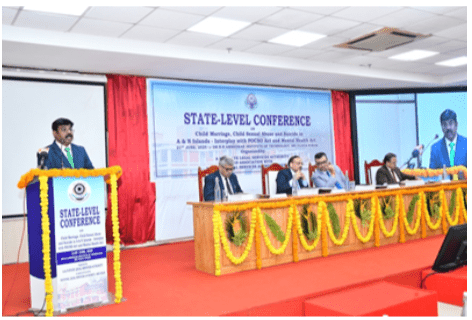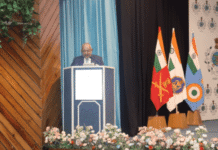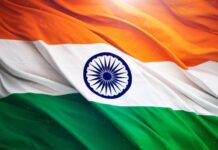Sri Vijaya Puram: As the Andaman and Nicobar Islands grapple with one of the highest suicide rates in India, a state-level conference held on June 21 in Sri Vijaya Puram has underscored the need for an urgent, coordinated response to the mental health crisis sweeping across the archipelago. Held at Dr. B.R. Ambedkar Institute of Technology, the event brought legal, administrative, and judicial leadership under one roof to deliberate on the rising tide of suicides, child sexual abuse, and the gaps in mental health support in the Union Territory.
The conference focused on the legal framework around the Protection of Children from Sexual Offences (POCSO) Act and the Mental Health Act, while also stressing the need for multi-sectoral collaboration to address psychological vulnerabilities in children and young adults.
Present at the conference were Justices Surya Kant and Dipankar Datta from the Supreme Court, T.S. Sivagnanam, Chief Justice of the Calcutta High Court, and Justice Sabyasachi Bhattacharyya, along with officials from the Andaman and Nicobar Administration. The high-level presence emphasized the gravity of the social issues under discussion, especially the suicide epidemic that continues to plague the region.
A growing body of research has pointed to the link between geographic isolation, limited access to mental health care, and rising suicide rates in regions like the Andaman and Nicobar Islands. The National Crime Records Bureau has repeatedly listed the islands among the top regions for suicides per capita, a trend that remains deeply concerning to policymakers and health experts alike.
What makes the crisis even more immediate is its frequency; suicides are being reported every few days, including recent tragic incidents that underline just how deeply embedded the issue is in the island’s social fabric. This regularity, and the absence of widespread mental health services suggests a structural gap that cannot be addressed by punitive or reactive measures alone.
At the conference, speakers called for the integration of mental health awareness with legal outreach, especially within schools, social welfare departments, and law enforcement agencies. The implementation of existing laws was also discussed, not just as a deterrent but as part of a broader, rehabilitative approach to societal vulnerabilities.
The POCSO Act remains critical in protecting children from abuse, but the gathering emphasized that legal instruments must be accompanied by psychological support systems, counsellor access, and family-based interventions to be effective truly. The same applies to suicide prevention, where early detection of emotional distress and community-level mental health literacy could play a defining role.
The event concluded with a vote of thanks by Rashid Alam, Registrar and Member Secretary of the A&N State Legal Services Authority. Though no new policies were announced, the presence of key judicial and administrative figures marked a significant step in placing suicide and mental health issues at the centre of institutional discourse.
With stakeholders finally converging to address what has long been a silent crisis in the islands, the hope is that legal awareness, psychological support, and sustained public engagement can together form the foundation of a more responsive and humane system, one that sees vulnerable lives not as statistics, but as individuals in need of timely care and protection.





